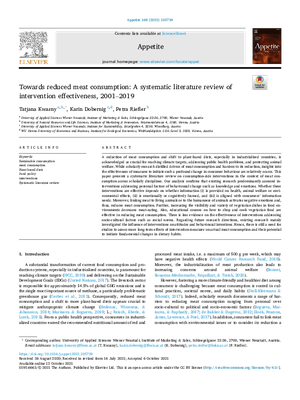Towards reduced meat consumption: A systematic literature review of intervention effectiveness, 2001–2019
A reduction of meat consumption and shift to plant-based diets, especially in industrialized countries, is acknowledged as crucial for reaching climate targets, addressing public health problems, and protecting animal welfare. While scholarly research distilled drivers of meat consumption and barriers to its reduction, insights into the effectiveness of measures to initiate such a profound change in consumer behaviour are relatively scarce. This paper presents a systematic literature review on consumption-side interventions in the context of meat consumption across scholarly disciplines. Our analysis confirms that existing research predominantly assessed interventions addressing personal factors of behavioural change such as knowledge and emotions. Whether these interventions are effective depends on whether information (i) is provided on health, animal welfare or environmental effects, (ii) is emotionally or cognitively framed, and (iii) is aligned with consumers’ information needs. Moreover, linking meat to living animals or to the humanness of animals activates negative emotions and, thus, reduces meat consumption. Further, increasing the visibility and variety of vegetarian dishes in food environments decreases meat-eating. Also, educational courses on how to shop and cook vegetarian food are effective in reducing meat consumption. There is less evidence on the effectiveness of interventions addressing socio-cultural factors such as social norms. Regarding future research directions, existing research mainly investigated the influence of interventions on attitudes and behavioural intentions. Hence, there is still a need for studies to assess more long-term effects of intervention measures on actual meat consumption and their potential to initiate fundamental changes in dietary habits.
https://biodiversitylinks.org/learning-evidence/wild-meat-collaborative-learning-group/evidence-collection/evidence-inbox/towards-reduced-meat-consumption.pdf/view
https://biodiversitylinks.org/learning-evidence/wild-meat-collaborative-learning-group/evidence-collection/evidence-inbox/towards-reduced-meat-consumption.pdf/@@download/image/image.png
File
Towards reduced meat consumption: A systematic literature review of intervention effectiveness, 2001–2019
Author(s):
Kwasny, Tatjana
,
Dobernig, Karin
,
Riefler, Petra
Publication Date: 2022
Location: Global
DOWNLOAD FILE
A reduction of meat consumption and shift to plant-based diets, especially in industrialized countries, is acknowledged as crucial for reaching climate targets, addressing public health problems, and protecting animal welfare. While scholarly research distilled drivers of meat consumption and barriers to its reduction, insights into the effectiveness of measures to initiate such a profound change in consumer behaviour are relatively scarce. This paper presents a systematic literature review on consumption-side interventions in the context of meat consumption across scholarly disciplines. Our analysis confirms that existing research predominantly assessed interventions addressing personal factors of behavioural change such as knowledge and emotions. Whether these interventions are effective depends on whether information (i) is provided on health, animal welfare or environmental effects, (ii) is emotionally or cognitively framed, and (iii) is aligned with consumers’ information needs. Moreover, linking meat to living animals or to the humanness of animals activates negative emotions and, thus, reduces meat consumption. Further, increasing the visibility and variety of vegetarian dishes in food environments decreases meat-eating. Also, educational courses on how to shop and cook vegetarian food are effective in reducing meat consumption. There is less evidence on the effectiveness of interventions addressing socio-cultural factors such as social norms. Regarding future research directions, existing research mainly investigated the influence of interventions on attitudes and behavioural intentions. Hence, there is still a need for studies to assess more long-term effects of intervention measures on actual meat consumption and their potential to initiate fundamental changes in dietary habits.


